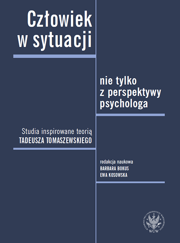Information about a product
| Edition: | 1 |
| Place and year of publication: | Warszawa 2024 |
| Publication language: | polski |
| ISBN/ISSN: | 978-83-235-6412-6 |
| EAN: | 9788323564126 |
| Number of page: | 284 |
| Binding: | Miękka ze skrzydełkami |
| Format: | 17x24 cm |
| Weight: | 455 g |
| Method of publication: | Druk |
| Publication type: | Praca naukowa |
| DOI: | https://doi.org/10.31338/uw.9788323564201 |
The Memory of Poland in Online Memory Media of Israeli Entertainment and Leisure Tourism in 2017–2020 Compared to Earlier Memory Patterns. Space, People, Culinary Traditions
The book is an attempt to reflect on changes in the image of Poland, its inhabitants and Polish culinary traditions in Israeli collective memory, which, for the last few years, have taken place under the influence of entertainment and leisure tourism from Israel to our country in terms of memory studies methodology: travelling memory and media induced memory.
Sample questions posed during the analysis of particular media are, among others: What is the purpose of emphasizing the possibilities of undergoing contrasting experiences related to the memory of the Holocaust and entertainment in contemporary Poland? What rhetorical strategies are used by the authors writing about gastronomic offer in Poland to overcome the narrative of disapproval of the cuisine of Polish Jews? How is Poland described in tourist sources during periods of tension in Polish-Israeli relations? In the subsequent chapters the author shows how memory patterns, established in Israeli collective memory, provide language, metaphors and cultural images for a relatively new experience of Israeli leisure tourism in Poland.
Keywords: Israel, Poland, collective memory, memory studies, leisure tourism.
The book is an attempt to reflect on changes in the image of Poland, its inhabitants and Polish culinary traditions in Israeli collective memory, which, for the last few years, have taken place under the influence of entertainment and leisure tourism from Israel to our country in terms of memory studies methodology: travelling memory and media induced memory.
Sample questions posed during the analysis of particular media are, among others: What is the purpose of emphasizing the possibilities of undergoing contrasting experiences related to the memory of the Holocaust and entertainment in contemporary Poland? What rhetorical strategies are used by the authors writing about gastronomic offer in Poland to overcome the narrative of disapproval of the cuisine of Polish Jews? How is Poland described in tourist sources during periods of tension in Polish-Israeli relations? In the subsequent chapters the author shows how memory patterns, established in Israeli collective memory, provide language, metaphors and cultural images for a relatively new experience of Israeli leisure tourism in Poland.
Keywords: Israel, Poland, collective memory, memory studies, leisure tourism.
Zobacz również
Polecane



Uniwersytet Warszawski. Kampus historyczny i jego dzieje99,00 zł
89,10 zł
Details
- The publication is the first comprehensive study of history and historical architecture of Warsaw University buildings located within Krakowskie Przedmieście and Oboźna Streets and the Visitationist Church adjacent to them. This unique urban development

Egipt ezoteryczny. Tajemna wiedza Egipcjan i jej wpływ na kulturę Zachodu49,00 zł
44,10 zł
Details
- The book is a study of the phenomenon present in European culture for two thousand years and constantly evolving, although based on an incorrect assumption that ancient Egyptians acquired knowledge inaccessible to others and jealously guarded, which gave

Kant wobec judaizmu i chrześcijaństwa na tle oświecenia niemieckiego45,00 zł
40,50 zł
Details
- The author discusses the common belief that Kant, rejecting Judaism as the beginning of Christian sacred history, thus denying his organic connection with Christianity, essentially represented the standard view of his era. Contrary to this thesis








